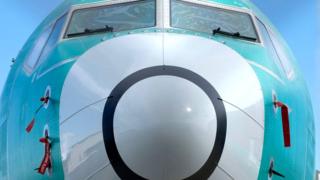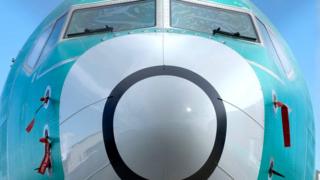Boeing 737 Max report criticises US approval process
A panel has sharply criticised the FAA and Boeing over certification of the company’s 737 Max. …

 Image copyright Getty Images
Image copyright Getty Images The US Federal Aviation Administration (FAA) did not adequately review the new automated safety system in Boeing’s 737 Max, an international panel has found.
The panel said the FAA delegated too much oversight to Boeing, while the planemaker had provided confusing information about the system, which has been linked to two deadly crashes.
The FAA thanked the panel for its “unvarnished” report.
Boeing pledged to work with the FAA on the recommendations.
The FAA, which oversees plane safety in the US, commissioned the review in April after Boeing 737 Max disasters in Ethiopia and Indonesia, which killed 346 people.
The agency had faced criticism over its approval of Boeing’s 737 Max, which has been grounded since March following the crashes.
In both incidents, investigators focused on the role played by a software system called MCAS (Manoeuvring Characteristics Augmentation System), which was designed to make the aircraft easier to fly.
Inquiries have shown the software – and the failure of sensors – contributed to pilots not being able to control the aircraft.
In the wake of the two accidents involving the 737 Max, the FAA has come in for some strong criticism.
Over the years it has delegated more and more safety certification work to Boeing. It simply doesn’t have the expertise or resources to do it all itself, and it’s a policy which US politicians have supported.
But recently it has been accused of becoming too close to the aerospace giant, and failing to exercise proper oversight.
This report bears out a least part of that claim.
It concludes that the FAA wasn’t sufficiently aware of what MCAS was and so was unable to exercise proper oversight; and that “undue pressures” were placed on Boeing staff carrying out tasks on behalf of the regulator.
FAA Administrator Steve Dickson has said he will review every recommendation made in the “unvarnished” review.
But the problem remains: if certification depends on Boeing marking its own homework, how can the FAA be sure it’s doing the job properly?
‘Undue pressures’
In a report published on Friday, the panel found that the the agency’s “limited involvement” and “inadequate awareness” of the automated MCAS safety system “resulted in an inability of the FAA to provide an independent assessment”.
It also found that Boeing staff performing the certification were also subject to “undue pressures… which further erodes the level of assurance in this system of delegation”.
While the FAA’s approval process scrutinised individual changes, it did not adequately consider how the changes might interact with existing systems or with pilots and crew, the report added.
The panel included representatives from the FAA, as well as officials from NASA and nine other countries, including Canada, China and Indonesia.
‘Bolster aviation safety’
The FAA pledged it would act on the report’s recommendations.
“We welcome this scrutiny and are confident that our openness to these efforts will further bolster aviation safety worldwide,” FAA Chair Steve Dickson said. “The accidents in Indonesia and Ethiopia are a sombre reminder that the FAA and our international regulatory partners must strive to constantly strengthen aviation safety.”
Boeing, which has blamed the crashes on erroneous data fed into the system, called safety a “core value”. It has said it is revising the plane’s software to improve safeguards.
“Boeing is committed to working with the FAA in reviewing the recommendations and helping to continuously improve the process and approach used to validate and certify airplanes going forward,” the company said in a statement.



